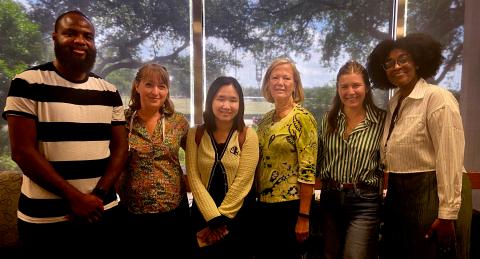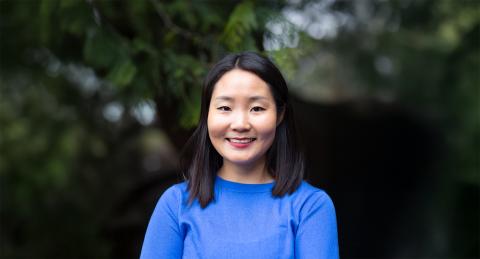
The University of Texas at Austin School of Nursing is marking the final year of its nationally recognized Transdisciplinary Precision Health Intervention Methodology Training Program in June 2025.

This innovative initiative, funded by a five-year National Institutes of Health award known as a T32 grant, was launched in 2020 to help develop the next generation of nurse scientists equipped to lead in the growing field of precision health.
The program was the only new T32 funded by the National Institute of Nursing Research in 2020 and has positioned UT Austin School of Nursing as a national model for nurse scientist development.
“The program enhanced the School’s profile as a leader in precision health research, attracted talent, secured NIH funding, deepened interdisciplinary training and positioned UT as a national model in nurse‐scientist development,” said Tiffany Ewere, MPH, program manager for community and academic partnerships.
The T32 program, officially known as the Ruth L. Kirschstein National Research Service Award Institutional Research Training Grant, supports institutions in providing training opportunities for pre- and postdoctoral fellows to lead in their fields.
This program would not have been what it is today without the vision and contributions of Miyong Kim, PhD, RN, FAAN, who passed away in June 2024. Kim not only authored the original grant and served as the founding principal investigator (PI) but also laid the foundation for what became one of the School of Nursing’s most meaningful and impactful initiatives. Her leadership and commitment to mentoring students left a lasting impact on both the School and the field of nursing research.

“I am deeply grateful to have worked with Dr. Miyong Kim, a visionary leader of this training program whose mentorship and legacy continue to inspire me,” said PhD candidate and 2024 cohort member Namuun Clifford, MSN, APRN, FNP-C. “Even during her final year of declining health, she demonstrated unwavering commitment to mentorship, community health and precision nursing science. Through her example, I learned what it means to be an extraordinary mentor. She encouraged me to pursue the NIH F31 predoctoral grant, helped revise my earliest drafts and gave me the confidence to submit an application that received a competitive score of 34.”
Kim’s legacy continues through the final year of the program, when Alexa Stuifbergen, PhD, RN, FAAN, James R. Dougherty Jr. Centennial Professor, assumed the role of PI and director, continuing to advance the program’s mission and lasting impact.
“Dr. Alexa Stuifbergen has also been an exceptional mentor throughout my T32 experience, profoundly shaping my research and professional development,” Clifford added. “When I shared my goal of mentoring junior students, she encouraged me to consider designing a formal peer mentorship program so that others could participate as well.”
This suggestion became the foundation for an initiative Clifford is now co-leading with 2025 T32 fellow Dongmi Kim, BSN, RN. With the continued support of Stuifbergen, as well as Associate Professor and Assistant Dean for Graduate and Doctoral Education Cara Young, PhD, RN, FNP-C, FAANP, FAAN, Clifford said they plan to launch the "Longhorn Nightingale Network," a peer mentorship program for PhD nursing students in Fall 2025.
“Their belief in my leadership potential has been instrumental in my growth as a nurse scientist and emerging leader,” she added.
Leading the Future of Precision Health
The primary goal of the School of Nursing’s T32 program was to train nurse scientists to develop, implement and evaluate personalized interventions for managing multiple chronic conditions, using the latest advancements in science and technology. Examples include culturally tailored self-management programs for hypertension and diabetes; psychosocial phenotyping–based interventions for heart failure and neuropathy; and ecological momentary assessment techniques for real-time cardiovascular symptom tracking.
“Fellows tackled precision self-management in chronic conditions, combining genetics/omics, computational science, digital health, machine learning, data analytics and addressing social determinants of health,” she added.
Through mentorship, team-based projects, seminars, boot camps and access to experts across UT and beyond, fellows gained both technical expertise and professional development. Each fellow was assigned a primary mentor, worked with them to develop an Individual Development Plan, and participated in monthly fellowship meetings. These meetings covered essential topics like grant funding, research tools such as the NIH All of Us data platform, and postdoctoral preparation.
“I chose the T32 Precision Health Intervention Methodology program to strengthen my methodological training in precision health, which is to predict and prevent disease before it occurs and to personalize care to the individual,” Clifford said. “As a nurse practitioner and researcher focused on advancing health equity through precision digital interventions, I saw this as a unique opportunity to deepen my skills and collaborate across disciplines to inform the design and implementation of inclusive, data-driven digital health solutions.
“Being a part of this program has provided an intellectually rich and supportive training environment,” she continued. “I've gained advanced training in machine learning, longitudinal modeling and precision health theories and concepts —skills I've applied directly to my dissertation research. The mentorship, seminars and interdisciplinary community pushed me to think more critically and creatively about how to pursue high-impact, interdisciplinary research that bridges nursing science, digital innovation and implementation methodology.”
National Recognition and Measurable Success
Over the past five years, the program supported 13 fellows across five cohorts, several of whom went on to secure prestigious postdoctoral NIH T32 fellowships funded by the National Heart, Lung and Blood Institute (NHLBI) and the National Institute of Nursing Research (NINR).
Alumni have also transitioned to impactful academic and research positions after participating in the program, including:
- Eliana Gill, who was a T32 scholar in 2020-22, became a Postdoctoral Fellow at the University of Washington
- Emily Croce, who was a T32 scholar in 2020-22, became a Postdoctoral Fellow at UT Austin’s Dell Medical School and School of Social Work
- Tonychris Nnaka, who was a T32 scholar in 2021-23, became a Postdoctoral Fellow at Geisel School of Medicine at Dartmouth College and is now Associate Dean for Research and Associate Professor at the University of North Texas Health Science Center
- Kayla Longoria, who was a T32 scholar in 2021-23, became a Postdoctoral Fellow at University of California, San Francisco, School of Nursing
Other alumni of the T32 program have secured academic positions and more recent trainees are in the process of completing their PhD.
In addition to world-class training, the program offered annual 2–4-day summer Precision Health Boot Camps, covering emerging topics such as AI, digital health and omics. Boot camp speakers included experts in AI and genomics, further reflecting the program’s commitment to cutting-edge science and interdisciplinary collaboration.
Fellows also benefited from strong grant-writing support and mentoring that prioritizes equity and interdisciplinary methods. All program-related publications acknowledged NIH funding, ensuring visibility and impact.
Clifford’s research focuses on identifying digital engagement phenotypes and social, digital and environmental determinants of heart failure self-care using real-world data from her advisor, Associate Professor and Associate Dean for Research Kavita Radhakrishnan, PhD, MSEE, RN, FAAN, FAHA, and her NIH-funded randomized controlled trial.
“This work means a lot to me, not only because of its scientific relevance but because it centers on older adults managing a severe chronic illness, many of whom are underserved by current digital health approaches,” Clifford added. “Through this research, I hope to help inform the design of more tailored, adaptive and equitable digital interventions.”